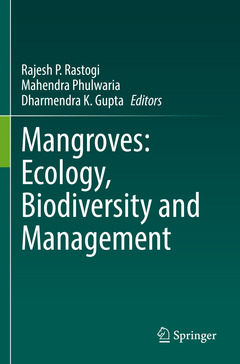Mangroves: Ecology, Biodiversity and Management, 1st ed. 2021
Coordonnateurs : Rastogi Rajesh P., Phulwaria Mahendra, Gupta Dharmendra K.

Dr. Rajesh P. Rastogi, Scientist, Research in Environment Division, Ministry of Environment, Forest & Climate Change (MoEF&CC), New Delhi 110 003, India Dr. Rajesh P Rastogi is scientist at Ministry of EF&CC, New Delhi, India. He obtained his graduate and post-graduate degree from Patna University, Bihar and completed PhD in Botany at Banaras Hindu University, Varanasi, India. Dr. Rastogi is the recipient of some national/international awards & fellowships. He was a visiting scientist at Friedrich Alexander University, Nuremberg, Germany and served as a visiting professor of biochemistry at Chulalongkorn University, Thailand. He has published several research/review papers in journals/Books of international repute and also edited some Books. His field of research includes freshwater/marine algae and cyanobacterial ecology, plant-physiology, phochemistry & photobiology and stress biology. Dr. Mahendra Phulwaria, Scientist, CS-I (Coral & Mangroves) Division, Ministry of Environment, Forest & Climate Change, New Delhi 110 003, India.
Dr. Mahendra Phulwaria is Scientist at MoEF&CC, New Delhi, India. He received his Graduation from Maharshi Dayanand Saraswati University, and did Post-Graduation and PhD in Botany from Jai Narain Vyas University, Rajasthan, India. His main field of research is Plant Tissue Culture (Organogenesis, synthetic seed technology, in vitro conservation, micropropagation of woody and medicinal plants), and Molecular Biology (genetic diversity analysis using DNA barcoding). Dr. Phulwaria was awarded with SERB Young Scientist by Department of Science & Technology, New Delhi and Post-Doctoral Fellowship by UGC, New Delhi. He is a Member of International Association of Plant Biotechnology, India Chapter. Dr. Dharmendra K. Gupta, Scientist/Director, Ministry of Environment, Forest & Climate Change, New Delhi 110 003, India.
Dr. Dharmendra K. Gupta is Scientist ‘F’ and Director (S) of Hazard
Compiles all aspects of mangroves its ecology, biodiversity and management.
Includes some case study related to mangroves restoration.
explains socio-economic and environmental benefits of mangroves
Date de parution : 10-2022
Ouvrage de 551 p.
15.5x23.5 cm
Date de parution : 10-2021
Ouvrage de 551 p.
15.5x23.5 cm
Thèmes de Mangroves: Ecology, Biodiversity and Management :
Mots-clés :
Mangroves; Biodiversity; Blue-carbon; Ecosystem; Restoration; Intertidal zone



